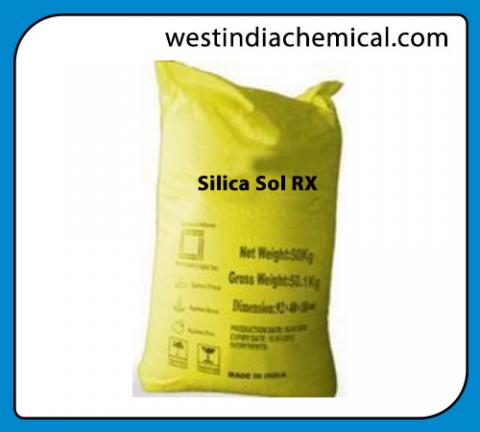Primary tabs

Silica Sol RX
SKU::RXSOL-19-1992-250
Silica Sol has many applications for paper, fibers, steel and catalysts. Most recently, it has been used by the semiconductor industry as a polishing agent for silicon wafers. Without the development of chemicals such as Silica Sol, the electronics industry would not be where it is today.
Silica Sol comes in a variety of types to suit your needs
Silica Sol has a wide variety of industrial applications such as:
■Frictionizing
■Adhesion and coating
■ Binding and hardening
■Polishing
■Investment casting
■Impregnation filler
■Battery manufacturing
■Modification and strengthening of organic resins
Particles and Surface State
Silica Sol made by growing mono-dispersed, negatively charged, amorphous silica particles in water. OH ions exist at the surface of the particles with an electric double layer formed by alkali ions. Stabilization is achieved by the repulsion between the same negatively charged particles. Disturbance of the charge balance will cause the Silica Sol to aggregate, resulting in high viscosity or gelation of the solution.
Stability
Effects of pH change
The higher the concentration or the smaller the particle size, the greater the effect pH change will have on gelation time and stability. Silica Sol is very stable in the 2-4 and 8-10 pH ranges as illustrated in the diagram below. If a formulation or coating system has a neutral pH, or the formulation requires a Silica Sol with greater stability.
When the pH exceeds 10.5 with a strong alkali, such as caustic soda or sodium silicate, coagulation and dissolution of the silica particles occurs.
Long chain amines tend to cause Silica Sol to gel, but ethylamine, morpholine and other similar amines tend to stabilize the sol. Silica Sol maintains its stability for a fairly long time even when the pH of an alkaline Silica Sol grade is lowered by the addition of an acid. However, the gelation time differs with the kind of acids used for pH adjustment. The gelation time when the pH is changed by adding hydrochloric acid and acetic acid is shown below. Organic acids tend to provide better stability in terms of gelation time, depending on the SiO2 concentration and particle size.
Effects of salts and electrolytes
Polyvalent metal ions will cause Silica Sol to gelate. This is because the polyvalent ions interfer with the surface charge of the Silica Sol. The resulting charge imbalance causes the particles to agglomerate. The surface charge maintains the Silics Sol stability. The degree of gelation is not uniform, and varies depending on the type, concentration, temperature, etc. of the electrolyte used. Monovalent salts react slowly, but polyvalent salts such as alum, react quickly at pH 9 and higher. When the pH is lowered, the effect of alum and magnesium sulfate decreases. This electrolytic effect on Silica Sol is useful to speed up or slow down the gelation. The gelation time of SilicaSol at 52° C with addition of sodium chloride and sulfate are depicted below.
Compatibility with organic solvents
Alcohol, acetone and other polarized solvents can be mixed with Silica Sol. However, there is a mixing limit and gelation may occur. The compatibility with alcohol when the pH is changed is shown below as an example. Silica Sol can be mixed with alcohol at any proportion.
Compatibility with surfactants
Generally, Silica sol is compatible with anionic and nonionic surfactants. Compatibility is dependent on impurities and the composition of the surfactant. Incompatibility may cause the Silica Sol to gel or agglomerate. Therefore, it is important to select the surfactant carefully. Silica Sol is compatible with a wide range of surfactants.
Compatibility with emulsion resins and water soluble resins
Silica Sol is compatible with emulsion resins and water soluble resins having the same pH and electric charge. In the case of emulsion resin, gelation and separation may occur depending on which emulsifier is used. Therefore, it is important to select the emulsifier carefully. Silica Sol is also compatible with a wide range of emulsifiers.
| COLOR: Milky white | FORM: Liquid | ODOR: Odorless |
| SOLUBILITY IN WATER: | Completely | |
| SPECIFIC GRAVITY: | 1.38-1.40 @ 68°C | ASTM D-1298 |
| pH (NEAT) = | 9.8-10.2 | ASTM E-70 |
| VISCOSITY: | 25cps @ 77°F | ASTM D-2983 |
| BOILING POINT: | 100°C @ 760 mm Hg | ASTM D-86 |
| FLASH POINT: | None |
Silica Sol RX manufacturer supplier distributor in Mumbai, Kandla, Kolkata, Vizag, Chennai, India, Fujairah, Dubai UAE, Muscat Oman, Kenya Africa. Get the best quality of Silica Sol RX at a competitive price from us. We have ready stock of Silica Sol RX in India, UAE Gulf, Oman, Kenya Africa. Contact us for bulk as well as small orders.




